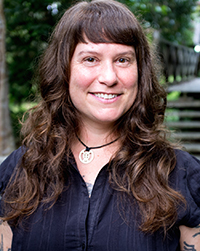 Dr. Corrie Moreau is the Martha N. and John C. Moser Professor of Arthropod Biosystematics and Biodiversity at Cornell University in the Departments of Entomology and Ecology and Evolutionary Biology in Ithaca, New York. She is also the director and curator of the Cornell University Insect Collection with over seven million specimens. Moreau earned her Ph.D. in evolutionary biology from Harvard University and was a Miller Fellow at the University of California, Berkeley. Before this, she completed her undergraduate and master's degrees at San Francisco State University.
Dr. Corrie Moreau is the Martha N. and John C. Moser Professor of Arthropod Biosystematics and Biodiversity at Cornell University in the Departments of Entomology and Ecology and Evolutionary Biology in Ithaca, New York. She is also the director and curator of the Cornell University Insect Collection with over seven million specimens. Moreau earned her Ph.D. in evolutionary biology from Harvard University and was a Miller Fellow at the University of California, Berkeley. Before this, she completed her undergraduate and master's degrees at San Francisco State University.
Moreau's research on the evolution and diversification of ants and their symbiotic bacteria couples field-based research with molecular and genomic tools to address the origin of species and how co-evolved systems benefit both partners. Also, she pursues questions on the role of biogeography, trait evolution, and symbiosis in shaping macroevolutionary processes to better understand broad-scale evolutionary patterns of life.
Moreau and colleagues were the first to establish the origin of the ants at 140 million years ago using molecular sequence data, and that the diversification of the ants coincided with the rise of the flowering plants (angiosperms). In addition, she showed that the tropics have been and continue to be important for the evolution of the ants. Moreau and colleagues also demonstrated the importance of gut-associated bacteria in the evolutionary and ecological success of ants, including showing that bacterial gut symbionts are tightly linked with the evolution of herbivory in ants.
In addition to her passion for scientific research, Moreau is engaged with efforts to promote science communication and increase diversity in the sciences.
Moreau was elected a Fellow of the American Association for the Advancement of Science in 2018, a Kavli Fellow of the National Academy of Sciences USA in 2016, and a National Geographic Explorer in 2014. She was highlighted as a Woman of Impact by the National Geographic Society in 2018.
(updated September 2020)
